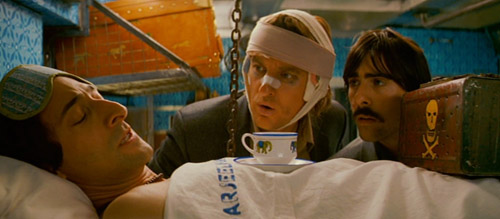The Darjeeling Limited (2007) Review
The Darjeeling Limited (2007)
Director: Wes Anderson
Screenwriters: Wes Anderson, Roman Coppola, Jason Schwartzman
Starring: Owen Wilson, Jason Schwartzman, Adrien Brody, Amara Karan, Waris Ahluwalia, Natalie Portman, Anjelica Huston, Bill Murray
“Yes, the past happened. But it’s over, isn’t it?” – one of the many very poignant lines in Wes Anderson’s emotionally charged The Darjeeling Limited.
Made in 2007, The Darjeeling Limited was Wes Anderson’s fifth feature film and included all of his now well known tropes, whether they be in the story, the visuals, or the soundtrack. This beautiful showcase, centered on the mourning of a loved one, is encased by a vibrant presentation of Indian culture that makes for not only one of the most typically Wes Anderson offerings of the filmmaker’s career, but a truly stunning film in its own right.
A year after the death of their father, three brothers – Francis (Owen Wilson), Peter (Adrien Brody) and Jack (Jason Schwartzman) – meet in India in order to go on a spiritual journey together by means of the Darjeeling Limited train. From the get-go it is clear that the three brothers have trust issues, and thus begins conflict by means of secrets and fights. Along their journey, the trio are kicked off the train, attend a funeral, have a few near misses of going home, briefly visit their mother, and finish their journey on a new train, all to cast off their father’s prized baggage. The tale is, of course, told in the screenwriter-director’s familiar idiosyncratic style.
Wes Anderson is a true auteur, particularly when it comes to visuals, and The Darjeeling Limited is no exception. From the opening scene, the film bombards you with Indian culture, starting by zooming through the streets in a rickshaw, then filling each frame with colour once on the titular train – the uniforms of those on board being particularly detailed and bright – and later juxtaposing the colour palettes of two funerals to create a genuine sense of catharsis. This is a tale of learning to grow after experiencing loss, and the colour palette is just as important to this journey as much of the dialogue. In Wes Anderson’s films, it is usually pointed out how unnatural the dialogue is between characters, and in this case this is notably used to create a world that feels slightly apart from our own, as if the characters are fulfilling an otherworldly obligation to their father and themselves. Filling such a well built and realistic setting with seemingly emotionally flat people makes the film all the more intriguing.
It is, of course, difficult to reference the visual style of Wes Anderson’s work without making note of his unique camera movements and framing. Here, every shot is carefully framed and filled with necessary information, the only camera movements seeming to come in harsh, notable zooms that reflect realisation or growth, or indicate comedy, with even tracking shots being kept to simple, steady presentations of information. Anderson has an unmistakable visual style, but in The Darjeeling Limited and the director’s other critical hits, the most memorable aspect of this style is how it always works to emphasise the people at the heart of his stories, the characters often being at the centre of frame, the workings of set, colour palette and other elements of visual design operating together as merely a backdrop.
The soundtrack of The Darjeeling Limited follows this aesthetic very closely too, mostly utilising traditional Indian music to ingrain the audience deeper into the setting of the film and emphasise the fish out of water aspect of the protagonists’ journeys.
The Darjeeling Limited, despite featuring the now iconic disconnected acting and far from naturalistic visual style, is an incredibly emotional journey for both the audience and the characters. Each character is going through their own private struggle as Francis is still healing from an almost life-ending car accident, Peter is coming to terms with becoming a father, and Jack is still getting over his break up from a toxic relationship, yet they each share the universal pain of losing a loved one; Anderson making the characters, their problems, and their coping mechanisms very relatable and their journey all the more riveting for it.
Wes Anderson’s fifth offering remains, even now at over a decade old, a truly beautiful film in every aspect. It is hearty, filled with visual splendor, offers a bittersweet aftertaste in conjunction with the filmmaker’s usual style, and is one of the best releases of his notable career. The Darjeeling Limited is a great film in every respect, one that can be enjoyed by people from all walks of life.
21/24


